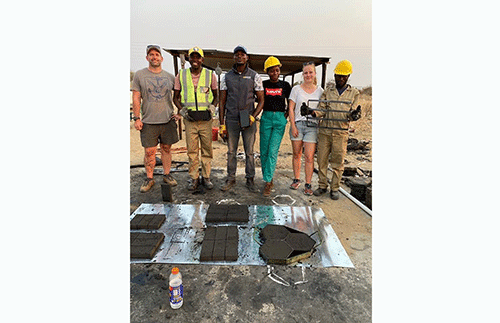When Ladislaus Shikerete saw people still use plastic bags despite the plastic bag levy introduced in Namibia in August 2019, he decided to turn plastic waste into profitable products.
The levy sees shops charge N$0.50 or more per bag as a way of reducing plastic waste and protecting the environment, but people continue to use plastic bags and other single-use plastic items such as food and beverage containers. The funds to be collected are expected to be channelled to the Environmental Investment Fund for reinvestment in improved waste administration.
Through his Wapa-Nawa Recycling Centre, he and his team collect plastic waste and converts it into eco-friendly bricks without the use of water and cement, all in the name of keeping the country clean.
“Our business model is called eco-preneurship, where plastic waste is collected from the plastic collectors and used for recycling,” said Shikerete.
The 32-year-old agriculture graduate from the University of Namibia told Youth Corner the plan is to have a fully-fledged factory that will allow them to produce enough bricks and expand to other towns in Namibia.
“The business has been facing both ups and downs both rough and successful stories but we are not profit-driven, we are driven by the concept of reduce, reuse and recycle. All we do is heat and melt the plastic and make bricks.”
Born at Shighuru village in Ndonga Linena constituency, Kavango East, Shikerete shared the team is busy building their office at Tuhingireni using bricks to show potential customers their product is of good quality and can be used to erect any structure.
“Our bricks have been lab-tested, and I say this because people have been sceptical about the bricks thinking they will burn if exposed to too much heat but that hasn’t been the case. Most of our clients use the bricks to build interlocks but they can be used to build any structure,” he assured.
The group further aims to collaborate with different municipalities to combat solid waste and finally create more employment for the youth as well as create more awareness on the concept of reduction, reuse, and recycling.
Wapa-Nawa employs four young Namibians temporarily as brickmakers. It also has contracted over 50 women who are plastic collectors as a revenue generating option for them.
Another institution involved in reducing waste is Unam in collaboration with the University of Natural Resources and Life Sciences, Vienna (BOKU) that have embarked on a project to address plastic waste management under the title ‘Assessment of household plastic waste handling in the city’.
Meanwhile, a waste management seminar will take place in Windhoek later this year, when the results of the collaborative project will be presented and discussed with various stakeholders for implementation



